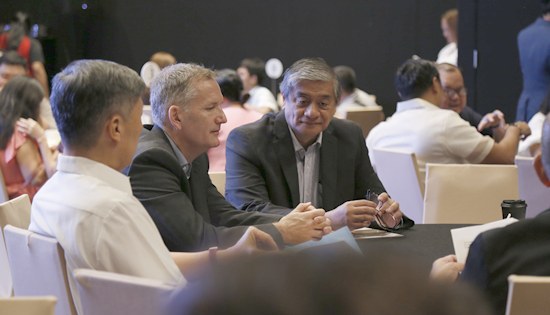Save the Children, EU’s
Project SCOPE transformed lives of 19,000 Persons with Disabilities
|

EU
Head of Cooperation Mr. Christoph Wagner with Save the
Children Philippines CEO Atty. Alberto Muyot and ANSA-EAP
Executive Director Mr. Emil Gozali during the closing
ceremony of Project SCOPE at B Hotel, Quezon City,
Philippines. |
Press Release
October 25, 2023
QUEZON CITY – After
three years of implementation Project SCOPE’s efforts to enhance the
lives of more than 19,000 persons with disabilities in Parañaque,
Taguig, and Pateros have paid off.
Project SCOPE empowered
children with disabilities, their parents, caregivers, organizations
of persons with disabilities (OPDs), and other civil society
organizations (CSOs) to engage effectively with local governments by
expressing their rights and monitoring the use of public resources
for their benefit. This participation, in turn, helped improve
policies, programmes and services for children with disabilities.
The P33.4 million project
was funded jointly by the European Union (EU) and Save the Children
and was co-implemented by the Affiliated Network for Social
Accountability -East Asia and the Pacific (ANSA-EAP)
During the closing
ceremony, the EU and Save the Children Philippines underscored the
critical role of organizations of persons with disabilities, groups
of children with disabilities, and parents to advocate for their
rights and their inclusion in the local governments’ policies and
programs.
“While Project SCOPE is
ending this month, the work has just begun for the local government
units (LGUs), OPDs and CSOs whose capacities were strengthened to
work together to develop and implement laws/policies, programs and
services to fulfill the rights of persons with disabilities,
especially children, and to allow them to participate in the design
of those policies” said Christoph Wagner, Head of Cooperation of the
Delegation of the European Union to the Philippines.
“We hope to share our
lessons in empowering children with disabilities to more partners so
that more local governments will recognize the capacities of
children with disabilities living in an enabling community,” said
Atty. Alberto Muyot, CEO of Save the Children Philippines.
People with disabilities,
in particular children, in Parañaque, Pateros, and Taguig are now
represented in planning and policy-making bodies such as the Local
Council for the Protection of Children (LCPC), Municipal Development
Council (MDC), and Municipal Disaster Risk Reduction Management
Council (MDRRMC). As one of the project’s activities, Project SCOPE
has also developed a database of people with disabilities to help
the LGUs ensure policies and programmes are inclusive and leave no
one behind.
Save the Children
Philippines also helped organise children with disabilities groups,
namely, Parañaque Dream Chasers (PDC), Pateros Fighting Scholars (PFS),
and Sipag at Pangarap, Accessible at Equal Education (SPACEE). As a
result of the project’s activities children with disabilities have
also been able to challenge social perceptions that influenced their
self-awareness and limited their personal development. According to
Aimylyn, 16, a youth advocate and member of partner organization
Parañaque Dream Chasers “Through Project SCOPE, I learned to become
more confident. Now, I am not shy to speak-up among my peers. I am
also able to share my opinions and listen to others in activities
like consultations of government.”
As a result of Project
SCOPE's involvement, anti-bullying and anti-discrimination measures
against persons with disabilities were filed in Taguig. Also, the
Children's Code in the three LGUs was revised to include provisions
for the welfare and participation of children with disabilities.
Project SCOPE also supported the OPDs in their advocacy efforts in
support of Republic Act 11650, or the Act Establishing a Policy of
Inclusion and Services for Learners with Disabilities in Support of
Inclusive Education, which was signed into law on March 11, 2022.
During Project SCOPE's
culminating activity, the six OPDs, three children with disabilities
groups, and three parent groups exchanged best practices in advocacy
and local governance.